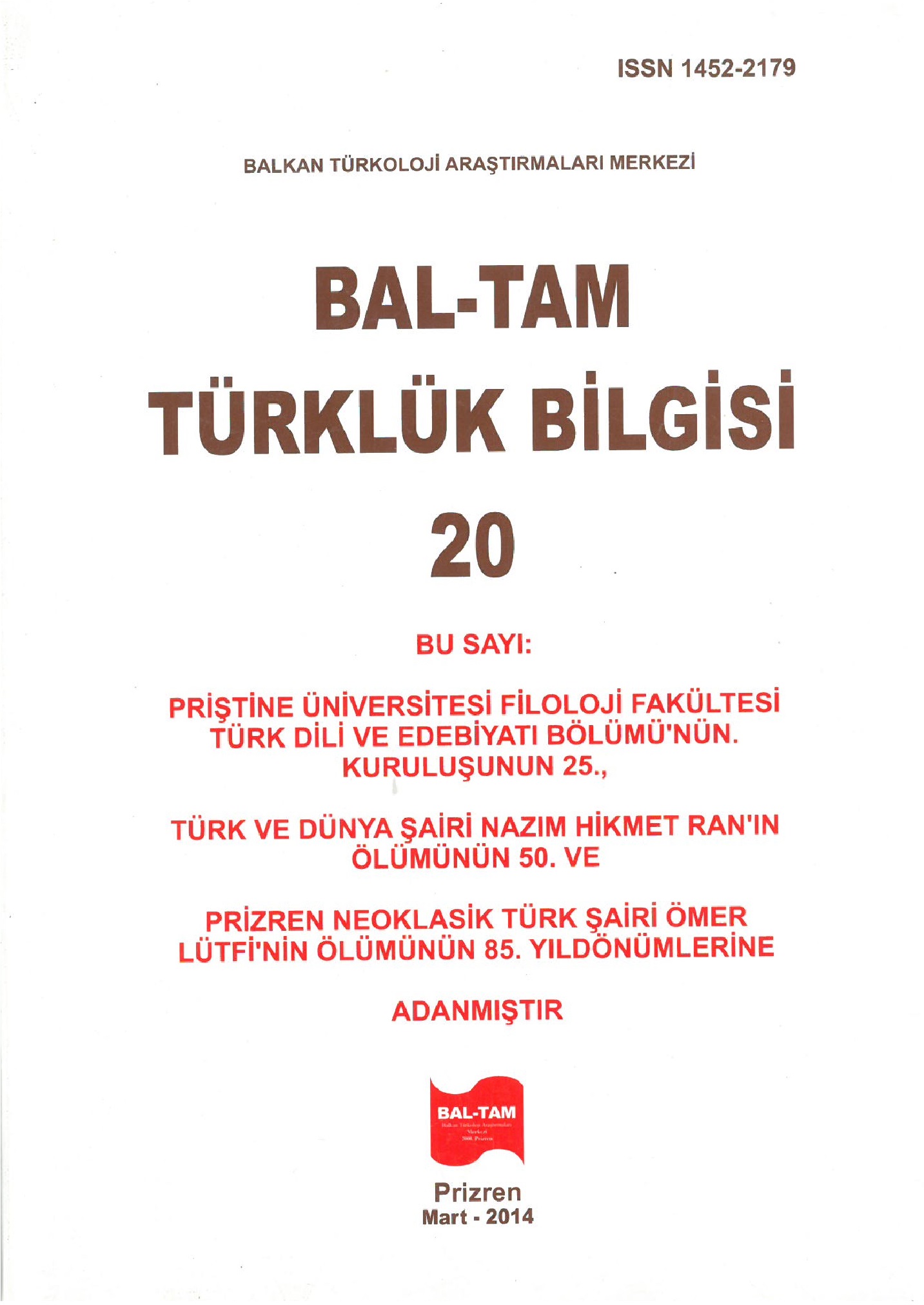LIMAN VON SANDERS’İN MUSTAFA KEMAL VE TÜRKLERİN ÇANAKKALE SAVAŞLARI’NDAKİ BAŞARILARINA DAİR İDDİALARI
Author :
Abstract
Çanakkale Savaşları Türkiye’de ve dış dünyada bugün de üzerinde
sıklıkla konuşulan bir konudur. Çanakkale denilince bütün olumsuz şartlara
rağmen Türk askerinin yazdığı zafer destanı ve bu zaferin şahsında sembolize
edildiği Anafartalar Kahramanı Mustafa Kemal gelmektedir. Pek az
bilinmekle birlikte, Çanakkale Savaşları’nın komutasının Alman Generali
Liman von Sanders’te olduğunu ve onun komuta heyetinde birçok Alman
subayın da yer aldığını hatırlamak gerekir. Türk askeri ile
kıyaslanamayacak kadar az sayıda da olsa Çanakkale Savaşları’nda
Türklerle aynı safta Alman askerleri de çarpışmış ve hayatlarını kaybetmiştir.
O döneme ait bilgi ve belgelere bakıldığında, Alman kamuoyunun bu
konudan pek haberdar olmadığını ya da bu konuya ilgi göstermediğini
söylemek çok da yanlış olmaz. Ayrıca, bu savaşta görev yapan birçok Alman
subayının yazmış olduğu hatıralarda önemli bilgiler ve değerlendirmeler
kayıtlıdır ancak, bu durum da sadece konuyla ilgili çalışmalar yapan çok
az sayıda Alman tarihçi tarafından bilinmektedir.
Bu çalışmanın odak noktasını, Alman subayı Carl Mühlmann’ın
Çanakkale Savaşları’nda yaşadıklarına dair notlarının yer aldığı
“Çanakkale Savaşı” adlı eseri, bu eserin 1927 yılında yayımlanmasının
ardından Liman Sanders’in eserle ilgili olarak üç farklı tarihte yazmış
olduğu Freiburg Alman Arşivi’nden elde edilen mektupları oluşturmaktadır.
Sanders, Mühlmann’ı yazdığı eser dolayısıyla bir yandan kutlarken, diğer
yandan da Çanakkale Savaşları ile ilgili dikkat çekici iddialarda
bulunmaktadır. Bunlar, Enver Paşa’nın Gelibolu’da bir ordu
konuşlandırılmasına karşı çıkarak Osmanlı İmparatorluğu’nun kaderini riske
ettiği; Sanders’in sadece emirlerini yerine getiren özellikle Mustafa Kemal’in
savaştaki başarıyı tek başına sahiplenip abarttığı; Anafartalar bölgesine tüm
topların, topçuların yerleştirilmesinin, idaresinin tamamen bir Alman işi
olduğu ve Çanakkale Savaşları’nda emir komutanın ‘sadece Almanlarda’
olduğu iddialarıdır. Çalışmamızda, bu bağlamda, Çanakkale Savaşları’nda çarpışan
başta Sanders, Mühlmann ve Heuck olmak üzere Alman subaylarının
eserleri, Liman von Sanders’in mektuplarında ileri sürdüğü iddialar
açısından ele alınmış ve değerlendirilmiştir.
Keywords
Abstract
The Gallipoli campaign is still a widely discussed issue in Turkey
and abroad. Gallipoli reminds us of the Anafartalar hero Mustafa Kemal and
the legend of the victory written by the Turkish soldiers despite all the
impossibilities. It is little known that the Turkish troops were commanded by
a German general called Liman von Sanders, and the fact that there were a
lot of German officers in his command chain should be remembered.
Nevertheless, incomparable to the number of the Turkish soldiers and much
less than them, there were a small number of German troops who fought and
lost their lives during the Gallipoli campaign. In fact, when the knowledge
and the related documents of the period then are analyzed, it will not be
wrong to conclude that the German public opinion is not aware of this fact,
or has little interest in it. Moreover, some significant knowledge and
comments can be found in the memoirs of the German officers that served in
the campaign, but few German historians who are interested in Gallipoli are
knowledgeable about them.
The focus of this study basically encompasses the letters written by
Liman von Sanders, having three different dates, obtained from the German
archives in Freiburg, in relation to the publication of “The Gallipoli War” in
1927 by Carl Mühlmann, a German officer who included his memoirs during
the Gallipoli campaign in his book. In his letters, not only does Sanders
praise Mühlmann for his work, but he also suggests these interesting claims
about the Gallipoli Wars: Enver Pasha risked the fate of the Ottoman Empire
by opposing the deployment of an army in Gallipoli; the Turkish troops,
especially Mustafa Kemal, who executed Sanders’ orders only, attributed the
accomplishments of the war to themselves without giving credit to anyone
else, resulting in exaggeration; it was the Germans who deployed and
directed all the artillery units in the Anafartalar region; it was “only the
Germans” who ruled the command chain during the war. In our study, the work of the German officers, notably Sanders,
Mühlmann, and Heuck has been studied in relation to the claims posited in
Liman von Sanders’ letters, coming up with an evaluation.
Keywords
- - Ataksor, Halis, Çanakkale Raporu, Timaş Yayınları, İstanbul, 2008.
- - Çalık, Ramazan, “Çanakkale Muharebelerine Alman Bakışı”, Osmanlı Araştırmaları XX, İstanbul, 2000, s. 355-383.
- - “Çanakkale İngiliz Orduları Başkomutanı Ian Hamilton’un Çanakkale Savaşları Raporu”, Çanakkale Onsekiz Mart Üniversitesi, Atatürk ve Çanakkale Savaşlarını Araştırma Merkezi, Çanakkale, 1999.
- - Karal, Enver Ziya, Osmanlı Tarihi, IX. Cilt, Türk Tarih Kurumu Yayınları, Ankara, 2011.
- - Kannengiesser, Hans, Çanakkale’de Türklerle Beraber, Bir Alman Albayının Gözünden Çanakkale, Timaş, İstanbul, 2009.
- - Kurat, Akdes Nimet, Birinci Dünya Savaşı Sırasında Türkiye’de Bulunan Alman Generallerinin Raporları, Türk Kültürünü Araştırma Enstitüsü, Ankara, 1966.
- - Martı, Metin, Çanakkale Hatıraları, Arma Yayınları, İstanbul, 2001.
- - Mühlmann, Carl, Çanakkale Savaşı, Timaş Yayınları, İstanbul, 2006.
- - Papen, Franz von, Der Wahrheit eine Gasse, Paul List Verlag, München, 1950.
- - Sayılır, Burhan, Türk Kurmay Subaylarının Gözüyle Çanakkale Savaşı, Salyangoz Yayınları, İstanbul, 2006.
- - “85. Yılında Çanakkale Savaşları Sempozyumu”, Çanakkale Onsekiz Mart Üniversitesi, Atatürk ve Çanakkale Savaşlarını Araştırma Merkezi, Çanakkale, 2001.





